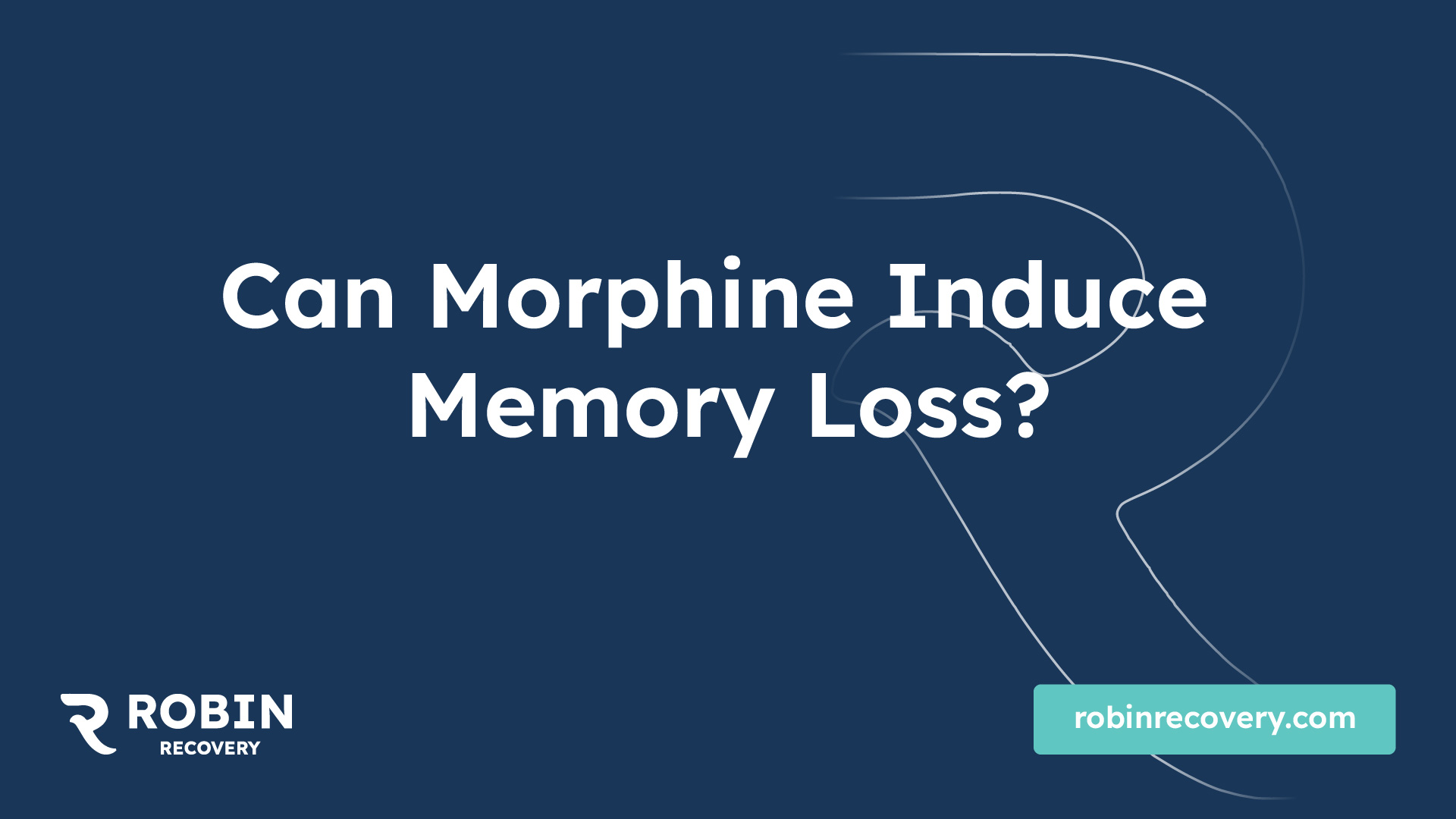Can Morphine Induce Memory Loss?

Understanding Addiction and Memory Loss
Morphine, an opioid used primarily for pain management, raises concerns about its potential effects on memory and cognitive function, particularly in those with a history of addiction. Understanding these effects can provide insight into the question: can morphine cause memory loss?.

Effects of Morphine on Memory
Research indicates that long-term use of opioids, including morphine, can negatively impact cognitive functions such as attention, memory, and processing speed. In older adults with cancer and chronic non-cancer pain, studies show that prolonged morphine use may lead to significant memory loss.
Factors that influence the extent of memory impairment include:
FactorInfluence on Memory ImpairmentDosageHigher doses can increase cognitive declineDuration of UseLonger use is correlated with severe effectsAgeOlder adults may experience more pronounced memory loss
Studies suggest that morphine can lead to difficulties in memory retention and recall, with cognitive domains such as psychomotor function and verbal working memory being particularly affected [1].
Cognitive Impairments Associated with Morphine
Cognitive impairments linked to morphine are understood to include difficulties with:
Chronic morphine administration can disrupt microtubule dynamics in the brain, as evidenced in studies conducted on animal models [2]. This disruption may contribute to the cognitive impairments observed in users, particularly among those with a long history of use.
Proper awareness and understanding of these potential cognitive effects are critical for individuals considering morphine for pain management, particularly in the context of addiction. For individuals dealing with opioid use, support mechanisms such as how can group therapy help treat my addiction? may be beneficial for addressing both addiction and related cognitive concerns.
Research Findings on Morphine
Impact on Cognitive Function
Research indicates that long-term administration of morphine can lead to significant impairments in cognitive and motor functions. In healthy volunteers, morphine infusions at therapeutic concentrations resulted in increased time needed for processing verbal information and reduced ability to maintain consistent force levels. Additionally, studies suggest that morphine use may cause cognitive impairment, manifesting difficulties in memory retention and recall.
The severity of memory impairment can vary based on dosage and duration of morphine use. Higher mean doses of opioids, including morphine, ranging from 120 to 190.7mg oral morphine equivalent daily dose, have been linked to declines in cognitive functions such as attention, language, orientation, psychomotor function, and both verbal working and delayed episodic memory. These cognitive effects might be more pronounced in older adults, underscoring the importance of monitoring cognitive health for individuals undergoing opioid therapy [1].
Opioid Dose (mg)Associated Cognitive Impairment120 - 190.7Attention, language, orientation, psychomotor function, verbal memory
Workings in the Brain
The mechanism by which morphine affects cognitive function involves changes in brain plasticity and the alteration of excitatory postsynaptic sites in areas responsible for functions such as reward and learning. According to recent studies, morphine influences the plasticity of the brain, which could contribute to the development of addiction behavior and cognitive deficits [4].
Combining morphine with alcohol or other substances can exacerbate these effects, leading to life-threatening complications. For instance, alcohol may cause long-acting morphine formulations to release too quickly, resulting in heightened adverse effects [5]. Understanding morphine's impact on the brain and cognitive function is crucial for developing more effective addiction treatments and addressing the question of can morphine cause memory loss?.
Memory Impairment Studies
Understanding the relationship between chronic morphine use and memory impairment is crucial, especially when addressing the question, can morphine cause memory loss?. Research indicates that the effects of morphine on memory can vary significantly based on dosage, duration of use, and individual susceptibility.
Chronic Morphine Administration
Chronic morphine administration has been shown to result in spatial memory impairment in male mice Source. In humans, long-term treatment of pain with morphine can lead to significant impairments in cognitive and motor function. According to studies, morphine infusions at therapeutic concentrations increased the time needed for processing verbal information, as well as decreased the ability to maintain consistent levels of force during tasks.
While some research indicates that patients receiving oral morphine for chronic non-cancer pain may not experience cognitive disruption after 12 months, pronounced cognitive effects such as changes in attention, language, orientation, and verbal memory are observed when higher doses of opioids are administered Conifer Park.
Study TypeFindingsMice StudiesSpatial memory impairment observed with chronic morphine administrationHuman StudiesLong-term morphine treatment leads to increased processing time and decreased motor functionPatient Studies12 months of oral morphine may improve cognitive aspects due to pain relief; however, higher doses cause cognitive deficits
Cognitive Effects of Opioids
The cognitive effects of opioids, particularly morphine, can manifest as difficulties in memory retention and recall. Studies reveal that higher mean doses of opioids are associated with notable changes in cognitive function, including impairments in attention, language, orientation, and psychomotor function. This suggests that the severity of cognitive impairment may depend on the dosage and duration of morphine use, with older adults potentially more susceptible to these effects Conifer Park.
Cognitive DomainImpact of High Doses of OpioidsAttentionWorsenedLanguageWorsenedOrientationWorsenedPsychomotor FunctionWorsenedVerbal Working MemoryPotentially Negatively Impacted
Through various studies, it has become evident that morphine's potential to induce memory impairment is significant, especially when used chronically or at higher doses. Ongoing monitoring and assessment of cognitive function are important for patients using this opioid. For further information on how to address addictive behaviors related to opioid use, check our article on how can group therapy help treat my addiction?.
Side Effects of Morphine
Morphine, while effective in treating severe pain, is associated with various side effects and potential complications. Understanding these issues is crucial for anyone considering morphine for pain management.
Commonly Reported Issues
Several side effects are frequently reported by individuals using morphine. These effects can significantly impact overall well-being and quality of life. The most commonly reported issues include:
Side EffectDescriptionConstipationDifficulty in bowel movements; often requires treatment.CNS DepressionSlowed functions of the central nervous system, which may impair cognitive abilities.NauseaA common reaction that may lead to vomiting as well.Urinary RetentionDifficulty in urination due to muscle relaxation.Respiratory DepressionA serious condition where breathing becomes shallow or ineffective.
These effects are outlined by NCBI Bookshelf. It is essential for users to monitor these symptoms and consult healthcare providers if they become problematic.
Potential Risks and Complications
In addition to common side effects, morphine use carries potential risks and complications, especially when misused. Key concerns include:
Immediate intervention is advised if there is a suspicion of developing a substance use disorder related to morphine. For additional insights on treatment options, such as group therapy for addiction, see our article on how can group therapy help treat my addiction?.
Treatment Considerations
Monitoring Cognitive Function
Monitoring cognitive function is essential for individuals using morphine, especially those on long-term opioid therapy. Research indicates that long-term use of opioids, including morphine, can affect cognitive functions such as attention, memory, and processing speed, potentially leading to memory loss [8]. Health professionals should regularly assess cognitive abilities in patients to detect any changes.
A recent study found that patients with chronic non-cancer pain treated with morphine for 12 months showed no significant disruptions in cognitive functioning overall. However, higher doses were linked to more pronounced cognitive effects, including attention and memory deficits. Regular cognitive assessments can help tailor treatment plans and ensure patient safety.
Cognitive FunctionPotential Impact of MorphineAttentionDecreased ability to focusMemoryImpairments in verbal memoryProcessing SpeedSlowed response times
Addressing Addictive Behaviors
Addressing addictive behaviors is crucial for individuals using morphine to manage pain or conditions. The interaction between morphine and neurotransmitters plays a role in potential cognitive impairments and the risk of addiction. The mechanisms underlying these effects are still being investigated, but evidence suggests that prolonged exposure to morphine can alter brain function, affecting areas responsible for reward and learning [4].
Individuals prescribed morphine should be continuously evaluated for signs of addiction, such as increased dosage requests or use beyond prescribed limits. Incorporating behavioral therapy can also be beneficial. Approaches like cognitive-behavioral therapy can help manage cravings and address underlying psychological issues related to addiction.
For more on treatment methods, including the benefits of group therapy for addiction, check how can group therapy help treat my addiction? and what can help with alcohol cravings?. These resources provide insights into additional support systems that can be utilized alongside medical treatment to aid recovery and cognitive health.
References
[2]:
[3]:
[4]:
[5]:
[6]:
[7]:
[8]:
